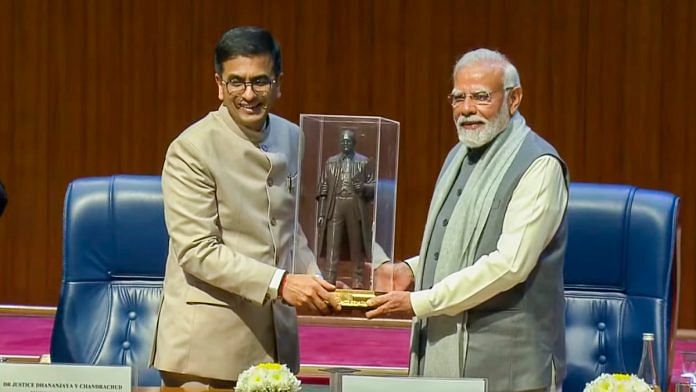Dear Chief Justice Chandrachud,
India will go to the polls in a matter of weeks. You are a formidably educated man, by all accounts a decent and worldly citizen, and you cannot be unaware of the existential significance of the next general elections. Their outcome will determine the fate of our republic. You are no doubt aware also that voters deprived of factual information cannot make an informed choice. And there is at this time perhaps no information of greater public interest than that which is being withheld by the State Bank of India.
Consider the crookedness of the political field on which the forthcoming elections will be staged. According to the Association for Democratic Reforms, the assets of the party currently in power—reportedly worth more than Rs 6,060 crore, making it the richest in India, if not the world—grew by a staggering Rs 1,050 crore between 2021 and 2022. Its principal national rival was, in comparison, worth a paltry Rs 805 crore. This imbalance in riches, achieved through anonymous donations, suggests India is at a very serious risk of deforming from a multiparty democracy into a de facto one-party state.
How did a lone political party amass so much wealth in such a short time?
Anonymous Electoral Bonds were devised to thwart such questions. The most unscrupulous offshore banker could not have dreamt up a more brazenly secretive device. Electoral bonds were conceptualised and floated with colonial-grade contempt for the ruled, who were effectively told that knowledge of how their rulers financed themselves was above their station as citizens. It was your intervention last month that voided this obscenely anti-democratic charade.
The SBI’s subsequent failure to honour your instruction to restore accountability and transparency by disclosing the details of the buyers and recipients of anonymous electoral bonds is a truly disturbing measure of India’s institutional degradation. The reasons adduced by the SBI in its plea seeking additional time to comply with your directive are frankly an insult to the intelligence of India’s highest court and its ordinary public.
You—and we—are being invited to acquiesce in the risible contention that India’s largest bank, which employs nearly a quarter of a million people, is not equipped to collate just under 45,000 records; that it requires four more months—until just after the elections—to organise and report the most rudimentary information in its possession.
But what truly catches the breath is the SBI’s attempt to portray its dereliction of duty as virtuous conduct. The bank claims that it is unable to act swiftly now because of the “stringent measures” it implemented in the recent past to uphold “donors’ anonymity” in accordance with clause 7(4) of the Electoral Bond Scheme of 2018. But the same clause in the same notification also explicitly enjoins the SBI to disclose names “when demanded by a competent court”. This stipulation was further reinforced in 2019 by the Supreme Court when it directed the SBI to maintain its electoral bonds records.
The most favourable inference that can be drawn from the bank’s failure to furnish information when ordered is that it prioritised one obligation—to preserve the identities of donors—at the expense of another: to keep its records in a form capable of being shared when directed by a court of law.
The disdain for the authority of the Supreme Court runs so deep that the SBI, directed on 15 February to make electoral bonds-related information public by 6 March, squandered a full fortnight before petitioning the court for more time exactly two days before the deadline for disclosure. Truant schoolchildren behave more responsibly than India’s most predominant financial institution.
Given all this, is it unreasonable for people to conclude that the SBI was hoping for the names attached to the anonymous electoral bonds to become shrouded in procedural rigmarole in the weeks leading up to the vote?
For the Supreme Court to bless the SBI’s spurious supplication for an extension until 30 June would be to withhold from the electorate, just before the elections to the Lok Sabha, information that could shape its decision. It would be tantamount to—not to put too fine a point on it—stamping on the spirit of democracy while performing its rituals.
When you and your distinguished colleagues sit down today to hear the SBI’s arguments, you will be engaged in something greater than procedural deliberation. You will be deciding whether India’s great experiment in democracy, erected on the rule of law, can withstand the most barefaced effort to subvert it.
Kapil Komireddi is the author of ‘Malevolent Republic: A Short History of the New India’, which was recently published in a revised and expanded paperback edition with a new foreword and afterword. Follow him on Telegram and Twitter. The views expressed above are personal.
(Edited by Prashant)



